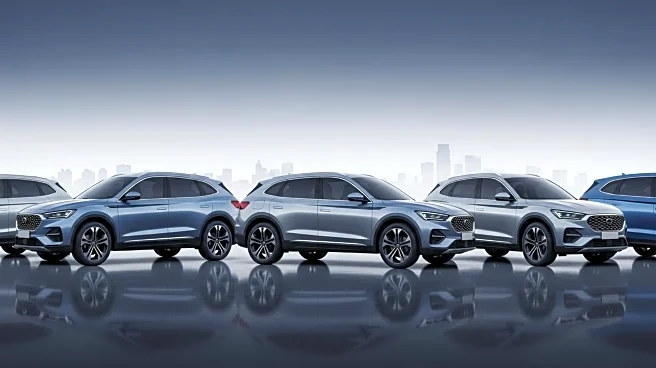What's Happening?
As gas prices fluctuate, the automotive industry is focusing on fuel-efficient SUVs to meet consumer demand for economical vehicles. Advanced engineering and hybrid technology have enabled SUVs to achieve fuel economy comparable to large sedans, without compromising on space, comfort, or all-weather capability. Consumer Reports has tested various SUVs, highlighting models that offer 35 mpg or more in combined city and highway driving. Notable models include the Toyota Corolla Cross Hybrid, Lexus NX Hybrid, and Toyota RAV4 Hybrid, all of which provide impressive fuel efficiency. These vehicles also carry the Green Choice designation, indicating low tailpipe emissions, making them environmentally friendly options.
Why It's Important?
The emphasis on fuel-efficient SUVs is significant as consumers seek to mitigate the impact of rising gas prices. Hybrid SUVs offer a practical solution, combining efficiency with performance, which appeals to environmentally conscious buyers. This trend reflects a shift in consumer preferences towards sustainable transportation options. The automotive industry stands to benefit from increased sales of hybrid models, while consumers gain from reduced fuel costs and lower emissions. The focus on fuel efficiency also aligns with broader environmental goals, supporting efforts to reduce carbon footprints and promote cleaner air.
What's Next?
The automotive industry is likely to continue innovating in hybrid technology, potentially leading to even more efficient models. As consumer demand for fuel-efficient vehicles grows, manufacturers may expand their hybrid offerings and invest in research and development to enhance performance and sustainability. Additionally, government policies promoting green technology could further incentivize the production and purchase of hybrid SUVs. Consumers can expect more options in the market, with competitive pricing and improved features.
Beyond the Headlines
The rise of fuel-efficient SUVs may influence urban planning and infrastructure development, as cities adapt to increased use of hybrid vehicles. This could lead to more charging stations and incentives for electric and hybrid car owners. The trend also highlights the importance of sustainable practices in the automotive industry, encouraging manufacturers to prioritize eco-friendly designs and materials.










